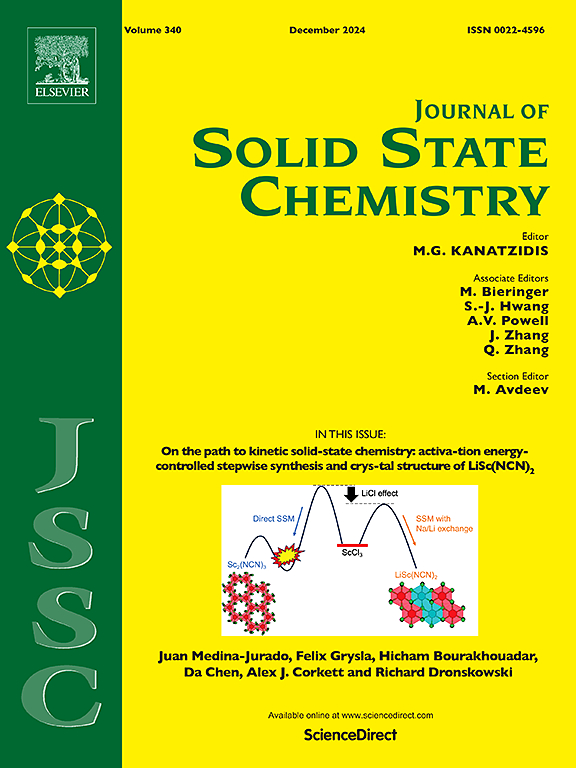The effect of hydrogen bonding on the magnetism quantum behavior of doped Co-MOFs
IF 3.2
3区 化学
Q2 CHEMISTRY, INORGANIC & NUCLEAR
引用次数: 0
Abstract
In this paper, the low temperature magnetic behavior of doped Co based metal-organic frameworks (MOFs) single-crystals [(CH3)2NH2]Co1-xMx[HCOO]3 (DMCo1-xMxF) with M = Mg, Zn, Mn, Ni and x = 0.1–0.5 were systematically investigated. It was found that the long-range interactions between magnetic ions were effectively modulated by the type of doping ions, with antiferromagnetic phase transition temperature of 18.5 K for DMCo0.8Ni0.2F, 13.5 K for DMCo0.8Mn0.2F, 14.5 K for DMCo0.9Zn0.1F and 12 K for DMCo0.7Mg0.3F. Abnormally large coercive fields and hysteresis loss in Mg- or Zn- doping samples reveal the existence of single-ion quantum magnets in Co-based MOFs after non-magnetic doping. The coexistence of both long-range magnetic order and individual single-ion quantum magnets was further confirmed by quantum step behavior observed in the low-temperature hysteresis loop for non-magnetic doping (Mg, Zn) samples. A systematic analysis of the changes in bond length, bond angle, and vibrational spectrum of the samples indicates that the enhancement of hydrogen bonding is beneficial for increasing the anisotropy of magnetic single ions, leading to an increase in magnetic hysteresis and coercive fields, exhibiting quantum tunneling behavior of magnetic single ions. For the magnetic doping (Mn, Ni) samples, complex magnetic behavior is exhibited due to competition between magnetic ions. Our research indicates that doping can effectively regulate the quantum behavior of magnetic ions. The strength of hydrogen bonds has a significantly impacts on spin reversal and interactions.

求助全文
约1分钟内获得全文
求助全文
来源期刊

Journal of Solid State Chemistry
化学-无机化学与核化学
CiteScore
6.00
自引率
9.10%
发文量
848
审稿时长
25 days
期刊介绍:
Covering major developments in the field of solid state chemistry and related areas such as ceramics and amorphous materials, the Journal of Solid State Chemistry features studies of chemical, structural, thermodynamic, electronic, magnetic, and optical properties and processes in solids.
 求助内容:
求助内容: 应助结果提醒方式:
应助结果提醒方式:


